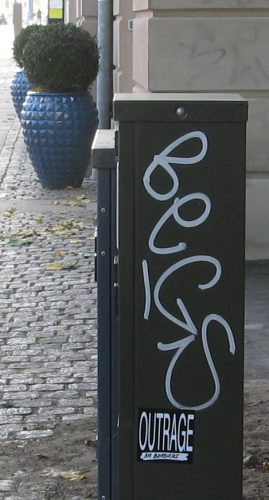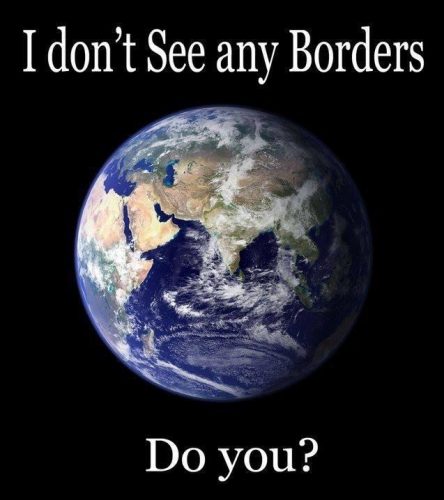En route to Europe and Asia, I find graffiti everywhere on streets and train stations in Copenhagen. Many words on the graffiti look for peace in an unstable world. Others look for a world without borders or simply a place to live in. One cannot miss the loud messages in Danish, English and Arabic, etched in bold colours, lighting up dark steely walls, shocking us out of our stupor, forcing us to watch, making sure that there are similar images waiting on the other side for the eye that happens to look away. It is out there: a clear expression of the outrage of those not within European borders. I can almost touch the palpable fury pouring out from hearts behind the hands of those spraying paint, desperately looking for homes for their loved ones, carving out words on Denmark’s heartline: “THOSE WHO CANNOT SPEAK MUST WRITE!”
Seven thousand kilometres away, in Northern India, old wounds are opening up once again, and the smouldering embers of communal divisions are being raked to light fires that consume populations. “Not within our borders!” is the cry. Return home (Ghar Wapsi) to Hindustan’s fundamental Hindu roots (Hindutava) is the silent slogan rising from the hearts of people on the street. Religion is being used for partisan party politics to provoke people into taking sides, and leaders are trying to win the hearts of voters by evoking the memory of communal riots. In protest, writers, artists and intellectuals are returning their prestigious national awards (Award Wapsi), but hidden beneath this rage is the impoverished condition of farmers in the Punjab – a state that once relied for its strength, self-sufficiency and economy on its fertile land. Farmers have few alternatives other than to sell their land to developers looking for prime property around newly constructed international airports that will soon be vying for flights from Montreal and Toronto. The environment is carcinogenic resulting in the vicious spread of malignant tumours that now require a special cancer train to transport patients to urban centres for treatment from the highly affected districts around Malwa – a region close to the River Sutlej.
I seem to have lost my mind along with my train of thought around the theme of this issue: The Heart has its reasons…. All that comes to mind are words from a verse by the poet, Faiz Ahmed Faiz where he writes to his beloved: “Do not expect from me the kind of love I once felt for you…/when the beauty of your eyes meant everything to me…/I cannot turn myself away now from the spent bodies of those lying in the dust…/and those who can no longer rise from centuries of neglect.” (liberally translated)
This used to be my country, I said to myself. It is no longer so. New borders are being carved where there were meant to be none. Breathless, I return to Canada and look for a faqir’s crazy songs among the first soft snowflakes of the season. I look back at how, 28 years ago, we launched Montréal Serai as a forum for unheard voices. We defined a new centre to express what was close to our hearts – an expression of the rare, unusual, and the unsaid. Today we continue to expand this centre – to redefine Canadian experience, and to bring the margins of the world a little closer to ourselves and our country.
This issue of Montréal Serai includes images, poems, stories, articles, interviews and reviews that delve deep beneath surfaces and peel layers to expose hidden feelings and sensitivities. Marc Krupa, a Montreal-based actor, writer and filmmaker, interviews Nabil Mehchi, co-creator of Interrupt This Program, a new five-part CBC documentary series. Each episode profiles three or four young artists in cities such as Beirut, Kiev, Port-au-Prince, Athens – cities that have seen recent turmoil – where history is being made even during the filming of the series.
The featured artist for this issue is Andréanne Bouchard, a member of the Atelier Graff in Montréal since 2007. As an artist, she looks consistently for a fragile balance in her installations, and thus creates a subtle universe both chaotic and frivolous.
Roberto Perezdiaz’s story “Monday Morning Madera Municipal Court” is a humorous and poignant description of the kind of treatment meted out to Mexican agricultural workers in the heart of the San Joaquin Valley of California. Jaspreet Singh, author of Chef and Helium, reveals in his poem (“The Emperor’s Clothes) the heart-wrenching silence of the ‘Saffron Man’ following the ‘Savage lynching in Dadri.’
Catherine Watson, a sociologist and member of the McGill Community for Lifelong Learning, recalls what Paris meant to Jean Rhys, author of the underworld and Wide Sargasso Sea: “Paris, you said, is life itself/it was your life/you peeled back the skin.” Louise Carson in her poems waits for spring to “take the cold wind from the storm,” while Jody Freeman traces father-daughter relationships in Ellipse: “I am the chaos of my father’s order,” she writes.
Neilesh Bose, Assistant Professor of History at the University of Victoria and author of Defying the Perpetual Exception: Culture and Power in South Asian Islam, reviews the portrayal of Muslim characters within plays such as Dion Boucicault’s Jessie Brown and Ayad Akhtar’s Disgraced. Sam Boskey, lawyer, educator, writer, community organizer and jazz player, introduces the new English-language edition of Gabriel Nadeau-Dubois’ award-winning book, Tenir tête, based on the recent student movement in Québec.
On behalf of everyone here at Montréal Serai, I would like to wish our readers and supporters a very pleasant and safe holiday season. As always, we welcome your comments and feedback. Please contact us on Facebook and follow us on Twitter.












